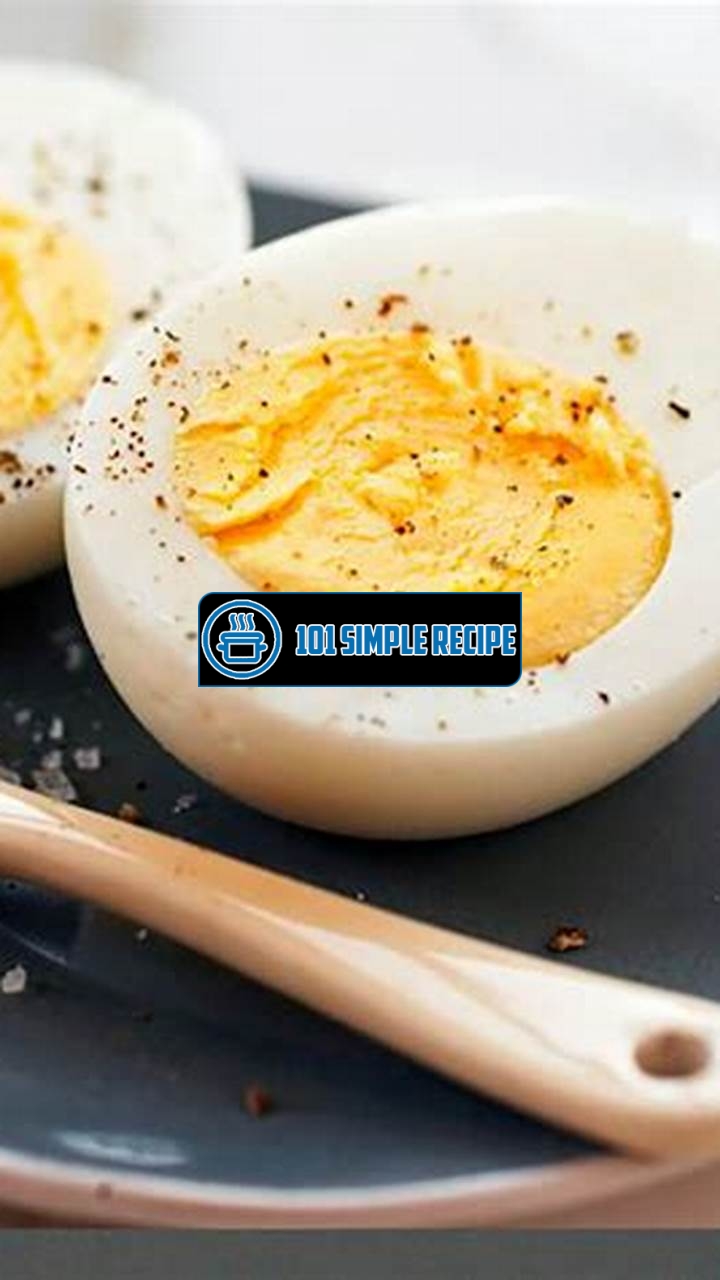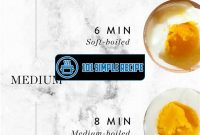Are you tired of ending up with overcooked or undercooked hard boiled eggs? Look no further! In this article, we will guide you through the foolproof way to make perfect hard boiled eggs every single time. Whether you’re making deviled eggs, egg salad, or just enjoying them on their own, mastering the art of perfectly boiled eggs is a kitchen skill worth having. So grab your apron and let’s get started on this egg-citing journey!

Understanding Hard-Boiled Eggs
Hard-boiled eggs are a versatile and popular option in the kitchen. They are a staple of many recipes, from salads to sandwiches, and can even be enjoyed on their own as a delicious and nutritious snack. Whether you’re a novice in the kitchen or an experienced cook, understanding the basics of hard-boiled eggs is essential in order to achieve that perfect, foolproof outcome every time.
What are Hard-Boiled Eggs?
Hard-boiled eggs are eggs that have been cooked in their shells in boiling water until both the yolk and the white are fully set. This cooking method gives the egg a firm, solid texture, making it easy to slice or chop. The yolk of a hard-boiled egg is fully cooked and has a pale yellow color, while the white has a slightly translucent appearance.
Hard-boiled eggs are a popular choice for various recipes and snacks due to their versatility. They can be used as a standalone ingredient, added to salads or sandwiches, or even used to make delicious deviled eggs. The firm texture and mild flavor of hard-boiled eggs make them a great addition to a variety of dishes.
The Benefits of Hard-Boiled Eggs
There are several benefits to incorporating hard-boiled eggs into your diet. First and foremost, they are a great source of protein. One large hard-boiled egg provides approximately 6 grams of protein, making it an excellent option for those looking to increase their protein intake.
Hard-boiled eggs are also rich in vitamins and minerals. They are a good source of vitamin B12, which is essential for proper nerve function and the production of red blood cells. Additionally, hard-boiled eggs contain vitamin D, which is important for bone health, and vitamin A, which supports healthy vision.
Furthermore, hard-boiled eggs are a convenient and portable snack. They can be prepared ahead of time and stored in the refrigerator, making them a quick and easy grab-and-go option for busy individuals. The protein and nutrients provided by hard-boiled eggs can help keep you feeling satisfied and energized throughout the day.
Choosing the Right Eggs
When it comes to making perfect hard-boiled eggs, choosing the right eggs is key. Fresh eggs are ideal for boiling, as they are easier to peel and less likely to crack during cooking. If possible, select eggs with the latest expiration date or those that have been recently laid.
It is also worth noting that the size of the eggs can affect the cooking time. Large eggs, which are the most commonly available, are typically used in recipes. However, if you prefer smaller or larger eggs, you may need to adjust the cooking time accordingly.
In summary, understanding the basics of hard-boiled eggs is essential for anyone looking to achieve that perfect outcome. Whether you’re using them in your favorite recipes or enjoying them as a snack, the firm texture and nutritional benefits of hard-boiled eggs make them a fantastic addition to any kitchen. By choosing the right eggs and following the proper cooking techniques, you can enjoy foolproof, perfect hard-boiled eggs every time.
Looking to lose weight? Try this weight loss recipe that incorporates hard boiled eggs for added protein and nutrients.
Boiling the Eggs
Mastering the art of boiling eggs is essential if you want to achieve the perfect hard boiled egg. This simple cooking method requires attention to detail to ensure that the eggs are cooked just right. By following a few key steps, you can achieve consistent results every time. Here’s how to boil eggs to perfection:
Preparing the Eggs
Before starting the boiling process, it’s important to properly prepare the eggs. Start by selecting fresh eggs, as they tend to peel more easily. It’s also a good idea to let the eggs sit at room temperature for about 10 minutes before boiling. This helps prevent the shells from cracking during cooking.
Next, gently place the eggs in a single layer at the bottom of a saucepan or pot. Adding a small pinch of salt to the water can make the eggs easier to peel later on. Fill the pot with enough cold water to cover the eggs by about an inch.
Boiling Techniques
Now it’s time to bring the pot of water to a boil. Place the pot over high heat and wait for the water to come to a rolling boil. Once the water is boiling, reduce the heat to medium-low and let the eggs simmer gently. This prevents the eggs from bouncing around and potentially cracking.
You can choose between two boiling techniques: the gentle boil or the rapid boil. The gentle boil involves maintaining a steady, gentle simmer throughout the cooking process. This method is ideal for achieving slightly creamier yolks. On the other hand, the rapid boil involves a more vigorous bubbling of the water. This results in firmer yolks, perfect for recipes where the eggs need to hold their shape, such as deviled eggs.
Timing and Temperature
The key to perfectly boiled eggs lies in getting the timing and temperature just right. For medium-sized eggs, a general rule of thumb is to boil them for around 9 minutes for a creamy yolk, or 10-12 minutes for a fully set yolk. Adjust the cooking time slightly depending on the size of the eggs and personal preferences.
If you prefer a soft-boiled egg with a runny yolk, reduce the cooking time by a minute or two. Likewise, if you prefer a firmer yolk, increase the cooking time by a minute or two. It’s important to keep in mind that the eggs will continue to cook slightly after they are removed from the heat, so factor in some additional cooking time.
Once the eggs are cooked to your desired level of doneness, remove them from the heat and immediately transfer them to a bowl of ice water. Let them sit for about 5 minutes to cool and stop the cooking process. This also helps in easy peeling of the eggs.
In conclusion, mastering the art of boiling eggs involves careful preparation, choosing the right boiling technique, and getting the timing and temperature just right. With these tips in mind, you can effortlessly make perfect hard boiled eggs every time. So go ahead and impress your family and friends with your foolproof hard boiled eggs!
If you want to learn how to make hard boiled eggs, check out this White Castle recipe for a unique twist on the classic dish.
Peeling Hard-Boiled Eggs
Peeling hard-boiled eggs can sometimes be a frustrating experience. It’s all too common to end up with chunks of eggshell stuck to the white, or worse, a peeled egg that has been completely mangled. Fortunately, there are several effective methods to make peeling hard-boiled eggs a breeze. In this article, we will explore three popular techniques: the traditional peeling technique, the shock and roll method, and the vinegar bath method.
Traditional Peeling Technique
The traditional peeling technique is the most common method used for peeling hard-boiled eggs. It involves tapping the egg gently on a hard surface to create small cracks all over the shell. Then, using your fingers, gently peel the shell away from the egg. This method can be effective, but it does require a bit of patience and finesse. It’s important to be gentle to avoid damaging the egg or leaving behind shell fragments.
⭐️ Tip: To make peeling easier, try peeling the eggs under cold running water. The water helps to separate the shell from the egg, making it easier to remove.
Shock and Roll Method
If you’re looking for a foolproof way to make peeling hard-boiled eggs even easier, give the shock and roll method a try. This method involves shocking the eggs in an ice bath after boiling them, and then rolling them gently on a hard surface to crack the shell. The idea behind this technique is that the shock of the cold water causes the egg to contract slightly, making it easier to separate the shell from the white.
⭐️ Tip: To shock the eggs, simply transfer them from the boiling water to a bowl filled with ice water. Let them sit for a few minutes before rolling.
Vinegar Bath Method
The vinegar bath method is another effective technique for easy peeling. This method involves adding a small amount of vinegar to the water when boiling the eggs. The vinegar helps to soften the eggshell, making it easier to peel. After boiling the eggs with vinegar, simply follow the traditional peeling technique to remove the shell.
⭐️ Tip: Use about a teaspoon of vinegar for every quart of water when boiling the eggs.
Note: Some people also claim that adding a pinch of salt to the boiling water can help prevent cracking, but the effectiveness of this method varies.
Peeling hard-boiled eggs doesn’t have to be a frustrating task. By following these effective methods, you can easily peel eggs without any mishaps. Whether you prefer the traditional peeling technique, the shock and roll method, or the vinegar bath method, you’ll be able to enjoy perfectly peeled hard-boiled eggs every time!
If you’re hosting a party and need a refreshing punch, this punch bowl recipe is sure to be a hit. Serve it alongside your hard boiled eggs!
Storing Hard-Boiled Eggs
When it comes to hard-boiled eggs, proper storing techniques are crucial in ensuring their freshness and safety. Whether you have a surplus of eggs or you want to prepare them in advance for easy snacking or cooking, it’s important to know how to store them correctly. In this article, we will guide you through the steps and tips to store hard-boiled eggs effectively.
Refrigeration and Shelf Life
Refrigeration is the key to extending the shelf life of hard-boiled eggs. Once you have cooked and cooled the eggs, it’s essential to place them in the refrigerator as soon as possible. The cool temperature of the fridge helps to slow down the growth of bacteria, keeping your eggs safe to eat for a longer period. Without proper refrigeration, hard-boiled eggs can become a breeding ground for bacteria and spoil quickly.
hard-boiled eggs can be stored in the refrigerator for up to one week. It’s important to note that the quality of the eggs may start to deteriorate after a few days, so it’s best to consume them within the first week for the best taste and texture.
Storage Containers and Tips
Choosing the right storage containers for hard-boiled eggs is essential to maintain their freshness and prevent any cross-contamination. Here are some tips on selecting and handling your storage containers:
- Use airtight containers: Opt for containers with tight-fitting lids to prevent any odors from seeping in and affecting the taste of the eggs.
- Avoid plastic containers: Plastic can absorb odors and flavors, which can be transferred to the eggs. Instead, opt for glass or stainless steel containers.
- Label and date your containers: To easily keep track of the freshness of your hard-boiled eggs, label each container with the date it was prepared.
Additionally, it’s important to consider these tips when storing hard-boiled eggs:
- Keep eggs in the main fridge compartment: While it may be tempting to store hard-boiled eggs in the door compartments for convenience, it’s best to keep them in the main compartment of the refrigerator, where the temperature is more consistent.
- Do not peel the eggs before storing: The shell acts as a protective barrier, preventing any bacteria from entering the egg. It’s recommended to leave the eggs in their shells until you are ready to eat or use them.
Food Safety Guidelines
Ensuring the safety of your stored hard-boiled eggs is of utmost importance. Follow these food safety guidelines to maintain their quality:
- Regularly check for signs of spoilage: Before consuming a stored hard-boiled egg, check for any off-putting smells, sliminess, or discoloration. If you notice any of these signs, it’s best to discard the egg.
- Avoid leaving hard-boiled eggs at room temperature: Hard-boiled eggs should be kept refrigerated at all times to prevent bacterial growth. Leaving them at room temperature for an extended period can increase the risk of foodborne illnesses.
- Avoid re-dipping peeled eggs in boiling water: If you have peeled the hard-boiled eggs and want to reheat them, avoid dipping them back into boiling water. This can increase the risk of bacterial contamination. Instead, use alternative methods like microwave reheating or consuming them cold.
By following these storing techniques and food safety guidelines, you can ensure that your hard-boiled eggs stay fresh, safe, and delicious for an extended period.
Enjoying Hard-Boiled Eggs
Hard-boiled eggs are versatile and nutritious, making them a fantastic addition to your meals and snacks. Whether you’re looking for a quick and easy snack or a satisfying meal, hard-boiled eggs can be enjoyed in various creative and delicious ways. Let’s explore some ideas to incorporate these protein-packed gems into your culinary adventures.
Classic Egg Salad Recipe
One of the most beloved ways to enjoy hard-boiled eggs is in a classic egg salad. This simple and satisfying dish combines the creaminess of mashed hard-boiled eggs with flavorful ingredients like mayonnaise, mustard, and seasonings. You can serve egg salad on a bed of lettuce, between two slices of bread for a sandwich, or even as a tasty dip with crackers or veggies.
Deviled Eggs Variations
Deviled eggs are another popular option that never fails to impress. These bite-sized delights are made by halving hard-boiled eggs, removing the yolks, and mixing them with a flavorful filling. Get creative with your deviled eggs by experimenting with different ingredients such as mayonnaise, mustard, pickles, bacon, herbs, or even spicy sriracha. The possibilities are endless, and each variation adds a delicious twist to this classic favorite.
Hard-Boiled Eggs in Salads
Adding hard-boiled eggs to salads is a fantastic way to elevate your greens. The rich and creamy texture of the eggs pairs perfectly with crisp vegetables and hearty grains. You can top your salads with sliced hard-boiled eggs, chop them and mix them into the greens, or even make a protein-packed Cobb salad with an abundance of colorful ingredients. The addition of hard-boiled eggs not only enhances the flavor but also provides an extra dose of protein and nutrients.
As you can see, hard-boiled eggs offer endless possibilities when it comes to enjoying them in your meals and snacks. Whether you’re whipping up a classic egg salad, experimenting with deviled eggs variations, or adding them to your favorite salads, these protein powerhouses are sure to satisfy your cravings. So go ahead, get creative, and make the most of your hard-boiled eggs!
Thank you for taking the time to read our guide on how to make hard boiled eggs. We hope you found the instructions clear and easy to follow. If you have any further questions or need more information, please don’t hesitate to reach out. We appreciate your support and hope to see you again soon for more helpful tips and tricks. Happy cooking!
Frequently Asked Questions
Here are some common questions about making hard boiled eggs:
| No. | Questions | Answers |
|---|---|---|
| 1. | How long should I boil the eggs for? | You should boil the eggs for about 9-12 minutes for a fully cooked yolk. |
| 2. | Should I use older or fresher eggs? | It’s best to use slightly older eggs as they are easier to peel. |
| 3. | Do I need to add salt to the water? | Adding salt to the water can help prevent the eggs from cracking. |
| 4. | How do I peel the eggs easily? | After boiling, place the eggs in an ice bath and then gently tap and roll them on a hard surface to loosen the shells. |
| 5. | Can I reuse the water used for boiling the eggs? | It’s generally not recommended to reuse the water as it may contain bacteria from the eggs. |
| 6. | How long can I store hard boiled eggs? | Hard boiled eggs can be stored in the refrigerator for up to one week. |
Closing Thoughts
We hope this article has equipped you with the knowledge and confidence to make perfect hard boiled eggs every time. Remember to follow the steps carefully and experiment with different cooking times to achieve your desired yolk consistency. Don’t forget to visit us again for more useful cooking tips and recipes. Happy egg boiling!
Jump to Recipe
How to Make Hard Boiled Eggs
Learn how to make perfect hard boiled eggs with this easy-to-follow guide. Whether you prefer a soft or fully cooked yolk, we’ve got you covered.
- 6 eggs
- Place the eggs in a single layer in a saucepan.
- Cover the eggs with cold water, ensuring they are fully submerged.
- Bring the water to a rolling boil over medium-high heat.
- Reduce the heat to low and let the eggs simmer for 9-12 minutes.
- While the eggs are simmering, prepare a bowl filled with ice and water.
- Using a slotted spoon, transfer the eggs to the ice bath and let them cool for at least 5 minutes.
- Peel the eggs and enjoy them as is or use them in your favorite recipes.






